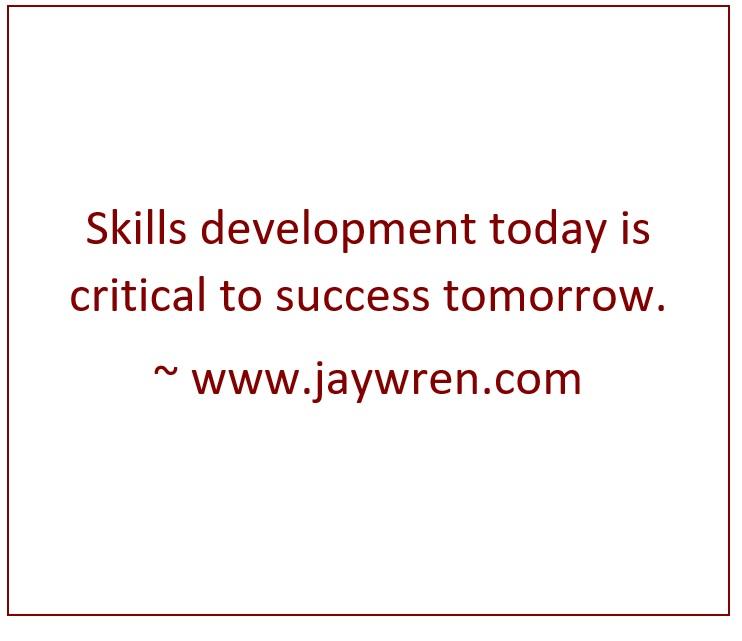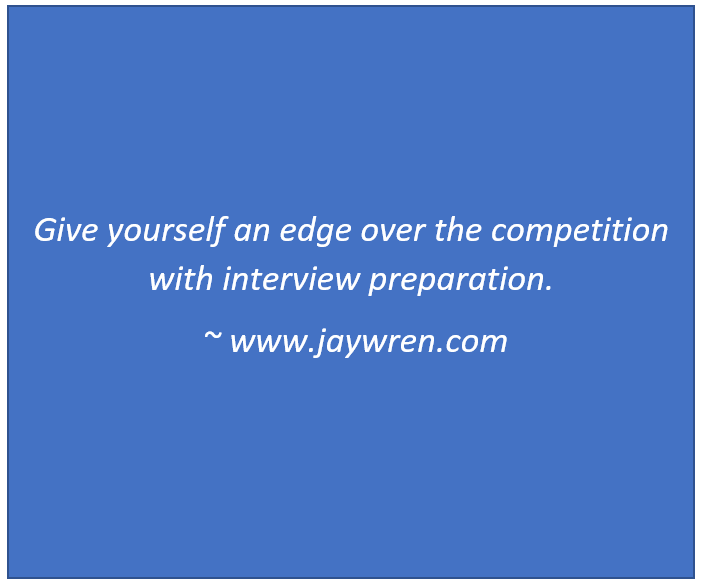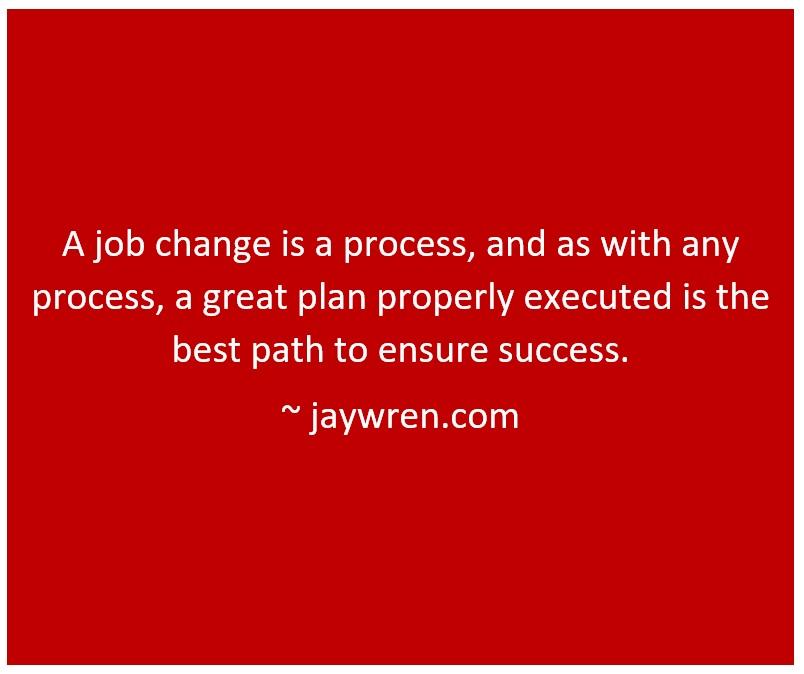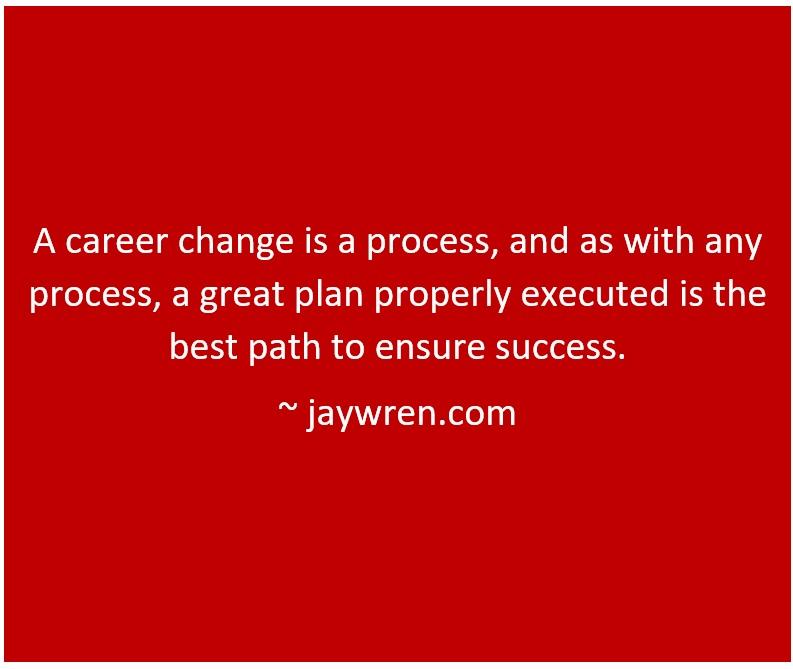Career Change Success: In this article you will find powerful tools that others have found helpful in making an effective career move.
Career Change Success: 5 Essential Elements
- Resume
- Resume Cover Letter
- Interview and Interview Preparation
- Thank You Letter
- Extra Tools and Tips
You don’t have to do everything for success. But you do have to do the right things. ~ www.jaywren.com
First, a Resume is Basic to a Career Change
Here is what you put into a resume and the order in which you put this information. If you replace this information with your information, you will have written a resume.
Your name
Street address
City, State Zip
Phone
Email address
Rule 1: Never refer to yourself in the third person in the body of the resume.
Rule 2: Use factual accomplishments and not subjective opinions of yourself.
- Example of a fact: exceeded assigned sales goal by 30%
- Examples of opinion; goal-oriented, creative, tenacious, strategic, honest, loyal: For a person to
use adjectives about themselves puts human resource people to sleep
Objective: This is optional and often redundant. Your resume has the objective of getting you interviews with an employer who sees a match in your location, your compensation, and your experience and that employer’s needs. It is conventional to state an objective here but you can probably find a better use for the space.
Employment History (Most recent job first)
Company Name, Location, and Period of Employment (From to)
Most recent title:
- Use bullet format.
- List things you have accomplished.
- Do not waste space on your just giving a job description.
- List things that showed you made a difference.
- Include increasing sales, reducing costs, promoting people, saving time, increasing productivity,
etc.
- Employers and recruiters search their databases for specific words.
- List successes with specific industry words or functions.
- Include the actual name of your product categories, product names, sales accounts, functions (e. g, Profit & Loss, Market Research or Software Names, New Product Development, Market Insights, Innovation), etc.
Next List Previous Titles at this company and again bullets on successes:
- List your accomplishments.
- Do not waste space on your just giving a job description.
- List things that showed you made a difference.
- Things you have accomplished include increasing sales, reducing costs, promoting people, saving time, increasing productivity, etc.
- Companies and recruiters search their databases for specific words.
- Include the actual name of your product categories, product names, sales accounts, functions (e.g., Profit & Loss, Market Research or Software Names, New Product Development, Market Insights, Innovation), etc.
Then include Previous Companies going back in time from most recent.
Education goes next after you have listed the first job you held after college or in your career: Part-time or vacation jobs held while in school are sometimes not listed except as a bullet to the education experience.
Do not put references or salary information on your resume.
Second, Resume Cover Letter
Suggestions on writing a cover letter
Your Name
Street Address
City, State Zip
Phone Number
Email Address
Date
Name of person receiving your letter
Company Name
Street Address
City, State Zip
Dear First Name:
(If you come recommended by someone, list that person’s name here). Name of person referred me to you. I am writing to apply for as position as a (fill in name of position) with your company. My resume is attached.
In my resume, you will find a record of success in (list competencies)
When may I interview with you?
Best regards,
Your Name
Third, Interview and Interview Preparation
Here is what you can do to have a better interview.
1) Prepare an agenda for the interview, things you want to cover.
2) Research the company. Find articles on the company and use information from these articles in your interview presentation.
3) Research the job and be prepared to talk about how your skills fit the job.
4) Review your skills and the information in your resume.
5) Be upbeat and positive about the world, the way you might be on a Friday afternoon.
6) Take with you extra copies of your resume, a typed list of questions, and paper and pen for notes.
7) Bring examples of your work that show your skills and successes.
8) Be factual about the work you did and the work others did to make you a success.
9) In the interview, listen to the questions you are asked and be sure that you understand the question before answering. If the question is too broad to enable you to give a good answer, ask the interviewing to help you understand better what he or she is trying to learn.
10) Be positive when you talk about your current company, your boss, and your job. Emphasize that you are looking to make a change to get more of what the company interviewing you has to offer.
11) Write stories of your successes as preparation to discuss how you can contribute to a company’s business.
Outline for an Interview Agenda
Candidates have found that the following outline is effective in getting the job.
In using this type of outline to prepare for an interview, a person will have anticipated and practiced how
to handle many of the questions and contingencies that may arise in a job interview.
- Why I am Interested in Working for Your Company
- What I Bring to a Company in Your Industry
- My Plans for Developing Your Business
- Ways that I Will Implement This Plan
WHY I AM INTERESTED IN WORKING FOR YOUR COMPANY
- The reputation of the company
- The long history of success of the company
- The appeal of the industry
- The opportunity to work in an environment that enables me to use my skills
- The company commitment to respecting and honoring their employees with programs
- The opportunity to work in the field of my choice
WHAT I BRING TO A THIS INDUSTRY
- Creatively and enthusiastically use the knowledge I gained in college to make the organization
more successful
- Have a range of appropriate skills
- Have developed marketing strategies to include customer service, pricing, and product selection
Fifth, Thank You Letter
Your name
Street address
City, State Zip
Phone
Email address
Date
Mr. /Ms. Interviewer
Name of company
Street address, City, State Zip
Dear Mr. /Ms. Interviewer:
Thank the person for meeting with you.
Express your impression of the company.
Express your interest in the job.
Best regards,
Your name
Extra Tools and Tips
- Reference material
- Work your network by making a list of every possible contact you have ever made in business and contact these people for ideas and opportunities.
- Ask for referrals of every person you contact.
- Lay out your goals as specifically as you can, but be aware that the more flexible you are in terms of money, location, and opportunity the more opportunities you will have available to you.
- Contingency recruiter or retained recruiter? In practice, how a recruiter is compensated is not nearly as important as what contacts the recruiter has. Typically, retained recruiters are conducting searches where the salary is above $750,000 and involve “C” level managers.
- Be organized. Make a list daily of your contacts, what you discussed what action you have taken and what action needs to be taken.
- Read the want ads in the local newspaper, national publications, and especially trade journals. Become an expert on what is in the job market.
- Before approaching a company directly, research it thoroughly. How is it structured? Bottler, distributor, direct, or broker sales? Public or private? Do you have a referral to get your foot in the door, etc.? Who are the key managers for the job you are seeking? To whom do these people report?
- Prepare for an interview the same way you would prepare for a major sales call, business review, or planning session where you are the key presenter.
- Follow up on contacts you have made.





